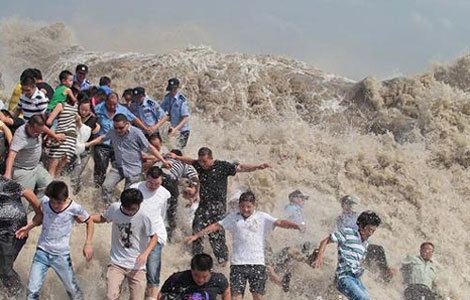Lack of oil leak report worries fishers
Updated: 2011-09-01 07:45
By Jin Zhu (China Daily)
|
|||||||||||
BEIJING - Fishers in Hebei province are worried that the absence of an official report showing how a recent oil leak has affected the environment of Bohai Bay will cool the overseas demand for their fish.
In August, the State Oceanic Administration and several ministries established an investigation team charged with looking into the leak. The results of its work had not been released by Wednesday.
The day before, Zhang Tao, a Beijing lawyer, asked the State Oceanic Administration to publish the details of the investigation as soon as possible. He said he wants to know how much oil has been leaked, how much harm the pollution has caused and what the government is doing in response to the disaster, China Youth Daily reported.
Some of the worst harm seen since the leak was discovered two months ago has been in Laoting county, in Hebei province.
Yang Jizhen, chairman of the Laoting fisheries association in Hebei province, said on Wednesday that he has recently received many calls from foreign customers concerned about the safety of eating scallops harvested there.
"A large number of deaths in the scallop population has already drawn a lot of attention from overseas consumers," he said. "Most of them are worried that those deaths were caused directly by the leak."
Statistics from Yang's association show that nearly 90 percent of the scallops harvested every year in Laoting county were sold to other countries.
In late July, Yang said that about 70 percent of the immature scallops in Liaoting county had died and estimated that the leak will cause the local fishing industry to lose 350 million yuan ($54 million).
"And the loss will be worse in the future if overseas consumers refuse to buy them this year," he said on Wednesday.
In the past, October has been the best month for scallop sellers, Yang said. That may not the case this year, though, since so many consumers have questions about the safety of the seafood.
Similar hardships exist in Changli, another county in Hebei province, where local fishermen rely heavily on harvesting scallops to make their livings. On August 25, a report by China Central Television found that a large number of live scallops in Changli county were smaller than they should have been at their particular stage of development.
"Businesses in the United States and Hong Kong plan to send staff members to the county to investigate the scallop industry," Cao Luquan, the manager of a local fishery company, said in a quote appearing in China Business Times on Wednesday.
"The company's fishery exports may be further impeded in the future if officials do not release the results of an environmental investigation soon," he said.
The oil leak in Bohai Bay was first discovered on June 4 and a subsequent one was found on June 17. Both originated from the bay's Penglai 19-3 oilfield.
Dried oil drops and oil belts have been detected in Hebei, Shandong and Liaoning provinces, the three provinces nearest the bay, as well as in Tianjin, a city that is also nearby. They have been blamed for recent economic losses inflicted on the local tourism and fish-farming industries.
Hot Topics
Li Na FIFA Novak Djokovic Liu Xiang Tiger Woods Yao Ming Rafa Nadal Ding Junhui Dirk Nowitzki Lin Dan Lionel Messi Sang Lan Maria Sharapova Wimbledon Barcelona
Editor's Picks

|

|

|

|

|

|







